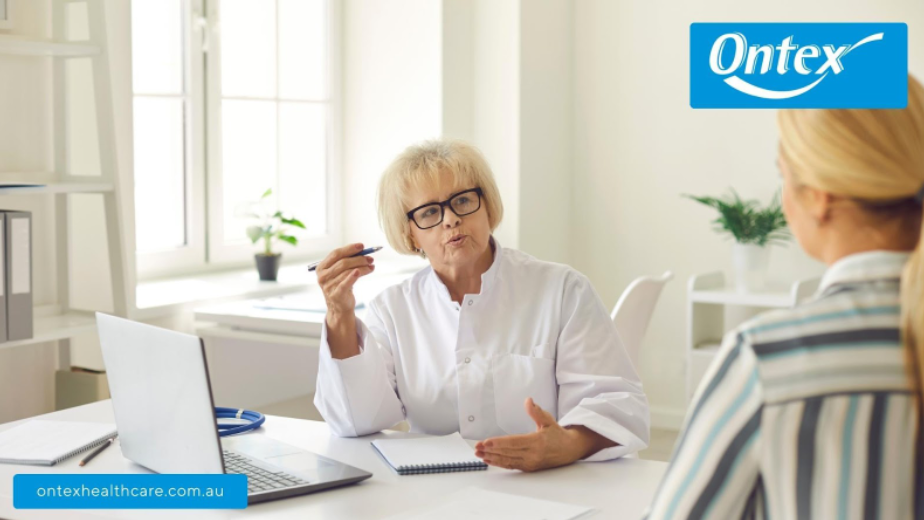Feeling embarrassed about incontinence is completely normal, but you don’t have to keep it to yourself. Maybe you’ve had the odd leak now and then, or maybe it’s something that happens more often. Either way, you’re not alone. Lots of people are dealing with it quietly.
To help you feel more prepared and less alone, Ontex Healthcare is here to make the first step a little easier. With compassionate support and trusted continence products, we’re by your side.
This article will guide you through how to start the conversation, so you feel more prepared and less anxious. We’ll begin by looking at what holds people back from seeking help and how to overcome those barriers with confidence.
Here we go.
What’s Stopping You? Breaking Down the Barriers to Speaking Up
Most people don’t rush to their GP (General Practitioner) to talk about incontinence. There’s a real need for help, but the hesitation often comes from how personal the topic feels.
The idea of discussing bladder issues can stir up embarrassment, anxiety, and even fear of being dismissed. These feelings are completely normal, but they can also mean living with unnecessary stress and discomfort.
Here are some of the most common concerns that hold people back:
- “It’s too embarrassing.” It’s a deeply personal topic, but your doctor has seen and heard it all. This won’t shock them.
- “I don’t want to be poked and prodded.” Most GP appointments begin with a conversation, not a physical exam. You’ll just talk.
- “I thought it was just part of ageing.” Ageing can affect the bladder, but incontinence isn’t something you have to accept without question.
- “I don’t know how to bring it up.” Many people don’t. A few simple phrases can open the door, and we’ll help with that shortly.
Recognising these barriers is the first step toward breaking through them.
Barriers lose their power once you name them. Now it’s time to move forward and look at how to begin that first, important conversation with your GP.
Make the First Step Easier: What to Say and How to Say It
If your GP appointment is coming up and you’re feeling nervous, take a breath. You’ve already taken a strong first step by deciding to speak up.
A bit of preparation can help. Jot down when leaks happen, what might trigger them, and how they affect your day. This can make the conversation easier and more focused.
When it’s time to speak, you might try:
- “Can I ask you something a bit personal? I’ve been having some bladder issues.”
- “I’ve noticed some leaks, and it’s starting to impact my day. I think I need some advice.”
- “I’m a bit uncomfortable bringing this up, but I’d really appreciate your guidance.”
Your GP is there to help, not judge. They’ll take it from there, and that’s what we’ll explore in the next section.
What Will the GP Do? Here’s What to Expect
Not knowing what to expect at the appointment can make everything feel more stressful. But there’s no need to worry. Most GP visits begin with a relaxed conversation. You’ll have the space to explain what you’re going through, and your doctor’s focus will be on understanding and supporting you.
They may start by asking questions like:
- How long have you had symptoms?
- How often do the leaks occur?
- Are there specific triggers, such as laughing, lifting, or urgency?
- How is it affecting your daily activities or confidence?
Once they understand the situation, your GP may want to rule out any medical causes. This could include checking for urinary tract infections, reviewing your current medications, or considering other health factors such as hormonal changes, prostate concerns, or nerve issues.
In some cases, they may give you a bladder diary to complete at home. Tracking symptoms for a few days can help both you and your GP see patterns that might not be obvious in a single visit. If needed, they may also refer you to a specialist for more tailored advice.
With a better understanding of how to start the conversation, you’re ready for what comes next: regaining a sense of control and building your confidence, one step at a time.
Life After That Chat: Rebuilding Confidence and Taking Back Control
Now that the conversation has started, you’ve already made a meaningful change. Many people find that just talking about their symptoms brings a sense of relief. From here, small changes can add up to a big difference in how you feel each day.
Your GP may recommend:
- Bladder training techniques, such as scheduled toilet visits
- Dietary adjustments, like reducing caffeine or increasing fibre
- Pelvic floor exercises to strengthen bladder control
- Continence care products that suit your lifestyle and needs
This is the moment where things start to improve. Every step you take from here builds confidence, and we’re with you as you find your way forward.
You Deserve Relief! Let’s Talk About It
Incontinence is nothing to be ashamed of, and you don’t have to face it alone. A short, honest conversation with your GP can lead to real improvements in comfort, control, and quality of life.
You’ve taken the first step just by being open to change. The next one is yours to take, and it’s worth it.
At Ontex Healthcare, we’re here to support you with expert guidance and continence care products designed for your comfort, dignity, and daily needs.
You deserve to feel confident in your body again. And with the right support, you can.https://dgmnews.com/


